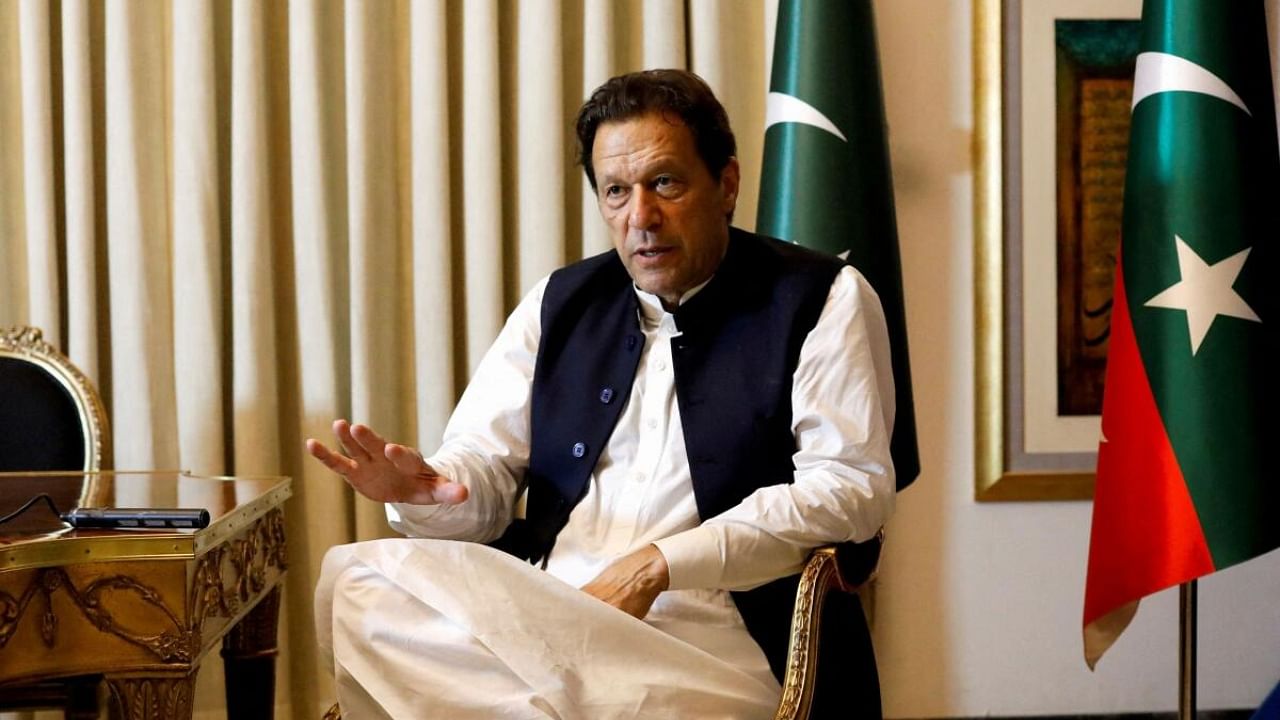
Former Pakistani PM Imran Khan.
Credit: Reuters File Photo
Imran Khan’s judicial remand was on Wednesday extended till September 13 by a special court in a case related to the alleged disclosure of state secrets, dashing former Pakistan prime minister's hopes of quick release from jail despite being granted bail a day earlier in a corruption case.
Judge Abual Hasnat Zulqarnain, who arrived at Attock jail in the Punjab province to conduct the hearing, issued the order in the case of the missing cipher, a classified state document that Khan had waved during a political rally ahead of his ouster from office last year.
The hearing of the case took place at high-security Attock District Jail following approval by the Ministry of Law and Justice amid security concerns expressed by the Interior Ministry.
Judge Zulqernain extended Khan’s judicial remand till September 13 in the cipher case, meaning that the former cricketer-turned-politician will remain in jail, according to Geo News.
The court, recently established to hear cases filed under the Official Secrets Act, also sent Khan's close aide and two-time foreign minister Shah Mahmood Qureshi on a 14-day judicial remand in the same case.
Qureshi, 67, Pakistan Tehreek-e-Insaf (PTI) party's Vice Chairman, was arrested on August 19. He was presented before the special court amid high security.
Authorities decided on Tuesday to hold the hearing inside the Attock jail where 70-year-old Khan has been kept since August 5 after his conviction in the Toshakhana corruption case.
Khan’s sentence was suspended and he was granted bail by a two-member bench of the Islamabad High Court on Tuesday, but he was not allowed to walk free, as the judge hearing the cipher case ordered that the former premier be kept in prison and produced for hearing on Wednesday.
Khan's five-member legal team — headed by Advocate Salman Safdar — attended the court hearing in the prison, the report said, adding that initially the team was denied access, but was later allowed to enter and meet Khan inside the jail.
Khan's party said only three lawyers were allowed to represent the former prime minister during the hearing.
Khan challenged in the Islamabad High Court the order to hold the hearing of the cipher case in the Attock jail.
His counsel Sher Afzal Marwat filed a petition that the notification by the Ministry of Law and Justice of August 29 to hold trial inside the jail was against the law as it violated the spirit of open trial.
He argued that the proceedings should be held in the judicial complex in Islamabad and suggested in-camera hearings if the purpose was to keep the proceedings secret.
Khan also challenged the appointment of an anti-terrorism court judge as the judge of the special court set up for his trial under the official secrets act of the country.
Khan made the Ministry of Law and Justice, Ministry of Interior, head of Federal Investigation Agency, Commissioner Islamabad, inspector general Islamabad police and superintendents of Adiala and Attock jails parties in the case.
Earlier, his party criticised the decision to conduct a hearing in Attock jail.
"When Imran Khan requested technology be used for his daily hearings it was spun as if he was trying to avoid them. Now, the hearing is ordered from his jail cell. Why can’t it be live on TV or at least in the presence of his friends and family,” PTI spokesperson Zulfiqar Bukhari said in a statement.
“The world should be able to watch if this illegal hearing has any element of justice within it. The plan was to trample & dismantle PTI … the Constitution & law got brutally murdered instead…,” he said.
The case launched earlier this month alleged that Khan and others were involved in the violation of the secret laws of the country.
In March last year, ahead of the vote of no-confidence that resulted in his ouster, Khan pulled out a piece of paper – allegedly the cipher – from his pocket and waved it at a public rally in Islamabad, claiming it was the evidence of an “international conspiracy” being hatched to topple his government.
However, during the interrogation with the joint investigation team (JIT) in the jail on August 26, Khan denied that the paper he waved at a public gathering last year was the cipher. He also admitted to losing the cipher, saying he couldn't recall where he kept it.
His principal secretary Azam Khan stated before a magistrate and the FIA that the Khan used it for his ‘political gains’ and to avert a vote of no-confidence against him.
Qureshi was foreign minister when the issue of the diplomatic cable erupted.
The purported cipher (secret diplomatic cable) contained an account of a meeting between US State Department officials, including Assistant Secretary of State for the Bureau of South and Central Asian Affairs Donald Lu, and Pakistani envoy Asad Majeed Khan last year.
Of late, Khan has come under increased scrutiny following the publication of a purported copy of the secret cable by the US media outlet The Intercept, with many in the previous government led by Shehbaz Sharif pointing fingers at the PTI chief for being the source of the leak.